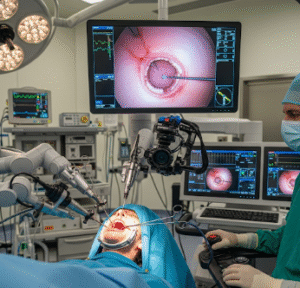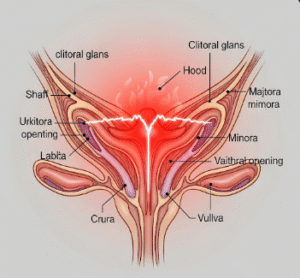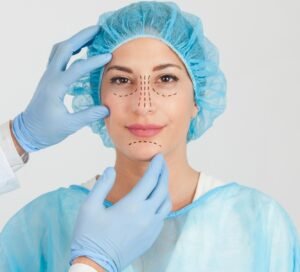Overview
Gastro-oesophageal reflux disease (GORD), also called gastroesophageal reflux disease (GERD), is a chronic digestive disorder where stomach acid or bile flows back into the esophagus, causing irritation and inflammation. Unlike occasional acid reflux, which is common after heavy meals, GORD is persistent and can significantly impact daily life, leading to heartburn, regurgitation, chest discomfort, and swallowing difficulties.
GORD affects adults and children worldwide, and if left untreated, it can lead to complications such as esophagitis, strictures, Barrett’s esophagus, or even esophageal cancer. South Korea offers advanced diagnostic techniques, cutting-edge medical therapy, and minimally invasive surgical options to manage GORD effectively.
Key Facts
➲ GORD occurs when the lower esophageal sphincter (LES) weakens, allowing stomach acid to flow back.
➲ Chronic heartburn, regurgitation, and chest discomfort are hallmark symptoms.
➲ Lifestyle factors like obesity, smoking, alcohol, and diet contribute to the condition.
➲ Untreated GORD can cause esophagitis, Barrett’s esophagus, and strictures.
➲ South Korea offers endoscopic diagnosis, advanced medications, and minimally invasive surgery for GORD.
➲ Early intervention improves quality of life and prevents long-term complications.
What is Gastro-oesophageal Reflux Disease (GORD)?
GORD is a chronic condition characterized by the frequent backflow of stomach contents into the esophagus. This happens when the lower esophageal sphincter (LES), a muscular ring separating the stomach and esophagus, becomes weak or relaxes inappropriately.
Over time, the persistent acid exposure damages the esophageal lining, causing inflammation (esophagitis), discomfort, and sometimes complications. People with GORD may also experience extra-esophageal symptoms, including chronic cough, hoarseness, throat irritation, or dental erosion.
What Symptoms Are Related to GORD?
GORD can present with a variety of gastrointestinal and extra-gastrointestinal symptoms:
➲ Heartburn – a burning sensation in the chest, often after meals.
➲ Regurgitation – the sensation of acid or food rising into the throat or mouth.
➲ Difficulty swallowing (dysphagia).
➲ Chronic cough or throat clearing.
➲ Hoarseness or voice changes.
➲ Chest pain mimicking heart conditions (requires urgent evaluation).
➲ Nausea or bloating.
➲ Bad breath or sour taste in the mouth.
➲ Dental enamel erosion due to acid exposure.
What Causes / Possible Causes
GORD develops due to a combination of anatomical, physiological, and lifestyle factors:
1. Dysfunction of the Lower Esophageal Sphincter (LES)
➲ LES relaxation or weakness allows stomach acid to flow backward.
➲ Often worsened after large meals or lying down.
2. Hiatal Hernia
➲ A condition where part of the stomach pushes through the diaphragm, weakening the LES.
3. Lifestyle Factors
➲ Obesity increases abdominal pressure.
➲ Smoking relaxes the LES.
➲ Alcohol, caffeine, spicy, and fatty foods worsen reflux.
4. Medications
➲ Certain drugs, including calcium channel blockers, nitrates, antihistamines, and sedatives, can contribute.
5. Pregnancy
➲ Hormonal changes and increased abdominal pressure may trigger reflux.
6. Other Causes
➲ Delayed gastric emptying.
➲ Connective tissue disorders like scleroderma.
When Should I See My Doctor?
Medical evaluation is essential if symptoms are frequent, severe, or persistent.
Seek care if:
➲ Heartburn occurs more than twice per week.
➲ Difficulty swallowing or food gets stuck in the throat.
➲ Persistent nausea or vomiting occurs.
➲ Unexplained weight loss accompanies reflux.
➲ Chest pain that could mimic heart problems.
➲ Signs of bleeding (vomiting blood or black stools).
➲ Hoarseness, chronic cough, or throat irritation persists.
Early consultation helps prevent complications like esophageal strictures, Barrett’s esophagus, and increased cancer risk.
Care and Treatment
Treatment depends on symptom severity, frequency, and risk of complications.
1. Lifestyle Modifications
➲ Elevate the head of the bed to reduce nighttime reflux.
➲ Avoid lying down immediately after meals.
➲ Maintain healthy weight to reduce abdominal pressure.
➲ Limit alcohol, caffeine, fatty, and spicy foods.
➲ Quit smoking and manage stress.
2. Medications
➲ Proton pump inhibitors (PPIs) – reduce stomach acid production (e.g., omeprazole, esomeprazole).
➲ H2 receptor antagonists – reduce acid (e.g., ranitidine, famotidine).
➲ Antacids – provide rapid, short-term relief.
➲ Prokinetics – improve gastric emptying and LES tone.
3. Endoscopic or Surgical Options
➲ Fundoplication surgery – reinforces the LES to prevent reflux.
➲ Endoscopic procedures – minimally invasive techniques to tighten the LES.
➲ In severe or medication-resistant cases, surgery may be recommended.
Treatment Options in Korea
South Korea provides state-of-the-art gastroenterology care for GORD, combining modern diagnostics with effective treatments.
Diagnosis in Korea
➲ Upper endoscopy (esophagogastroduodenoscopy) for direct visualization.
➲ pH monitoring to quantify acid exposure in the esophagus.
➲ Esophageal manometry to evaluate LES function.
➲ Advanced imaging for hiatal hernias or structural abnormalities.
Medical Treatments in Korea
➲ Personalized PPI therapy based on severity and lifestyle.
➲ Endoscopic therapy for patients with non-responsive reflux.
➲ Nutritional counseling and lifestyle programs to prevent recurrence.
Surgical and Advanced Therapies
➲ Laparoscopic fundoplication for severe or complicated GORD.
➲ Minimally invasive endoscopic techniques to restore LES function.
➲ Robotic-assisted surgery for high precision and faster recovery.
Rehabilitation and Support
➲ Post-treatment follow-up and diet management.
➲ Monitoring for Barrett’s esophagus in chronic patients.
➲ Integration of lifestyle coaching to maintain long-term symptom control.
Quick Highlights Box
➲ GORD = chronic acid reflux causing heartburn, regurgitation, and chest discomfort.
➲ Often results from LES weakness, hiatal hernia, lifestyle factors, or medications.
➲ Symptoms include heartburn, regurgitation, dysphagia, chronic cough, and hoarseness.
➲ Untreated GORD can lead to esophagitis, strictures, Barrett’s esophagus, or cancer.
➲ Lifestyle changes and medications (PPIs, H2 blockers, antacids) are first-line therapy.
➲ Korea offers advanced endoscopic diagnostics, minimally invasive surgery, and personalized care.













